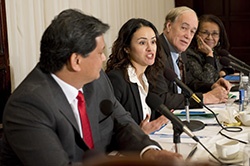
Angelo Ancheta, Liliana M. Garces, Gary Orfield,
and Shirley Malcom |
December 2015
On December 7, two days before the Supreme Court heard oral arguments, AERA held a briefing at the National Press Club on Fisher v. University of Texas at Austin. The briefing featured a panel of four experts, including Angelo Ancheta, Liliana M. Garces, Gary Orfield, and Shirley Malcom. The purpose was to make accessible prior to oral argument the scientific bearing on the university’s use of race as one factor in its admissions policy. Key topics included the benefits of diversity, the compelling interest of the government in fostering diversity, and approaches to effectively achieve those benefits in a narrowly tailored way.
The briefing followed up on the amicus brief that AERA and nine other scientific societies filed before the Supreme Court in late October. The event, which was webcasted live, had over 50 attendees on site and more than 200 participating online. The briefing was covered by a number of news outlets.
Angelo Ancheta, counsel of record for the AERA et al. amicus brief, spoke on the legal context of the brief and the importance of social science research for education. He explained how the body of research supports the two important components of the case: (1) that the university’s interest in student body diversity is sufficiently important to be a compelling governmental interest, and (2) that the university’s race-conscious admissions policy is narrowly tailored to its interest in diversity.
Ancheta was followed by Liliana M. Garces, assistant professor of higher education at the Pennsylvania State University, and counsel of record for a research brief signed by 823 scholars. Garces discussed research on the benefits of diversity on campus. She explained how social science shows that it is imperative to have a positive racial climate on campus and to pay attention to cross-racial interactions.
Gary Orfield, professor of education, law, political science, and urban planning and co-director of the Civil Rights Project/Proyecto Derechos Civiles at the University of California, Los Angeles, spoke on campus strategies for achieving the benefits of diversity. He went into detail on how affirmative action is the most valuable strategy compared to the percent plan, socioeconomic status preference, and outreach alternatives.
Shirley Malcom, head of education and human resources programs at the American Association for the Advancement of Science, concluded the panel discussion with her perspective on the potential consequences of the case for the workforce and STEM education. Malcom emphasized the vital importance of affirmative action by sharing that in 2014 only 167 out of 9,568 engineering doctorates were given to blacks. Following Malcom’s talk, there was a lively and engaging question-and-answer session.
“There is a need for research on these issues to be brought to the forefront and shared broadly with the public,” said AERA Executive Director Felice J. Levine, who moderated the event. “AERA has long been committed to sharing the research evidence that demonstrates the educational benefits of a diverse student body in education, generally, and in higher education, in particular.”
The briefing was cosponsored by the American Association for the Advancement of Science, the American Anthropological Association, the American Sociological Association, the Association for the Study of Higher Education, and the American Statistical Association. The five sponsoring organizations were among the nine who co-signed the AERA et al. amicus brief.
The Supreme Court will release its decision before the summer of 2016.
Video and media briefing materials from the event can be found on the AERA website.